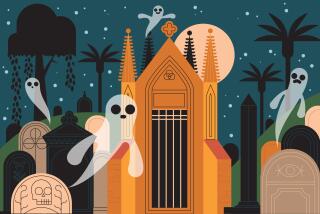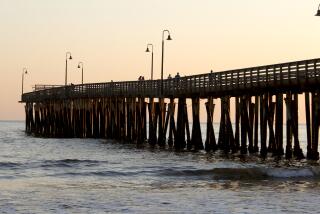Ghost Town Bill May Leave Calico in the Dust
They are dusty remnants of California’s Gold Rush past, two little ghost towns, 300 miles apart.
One is Bodie, a wind-swept blip in the sage-covered emptiness of Mono County. The other is Calico, a sunbaked outpost near Barstow. They have coexisted in harmony--until now.
A bill before the Senate today aims to make Bodie the official ghost town of California. Not surprisingly, folks partial to Calico are a tad riled up.
“Why Bodie?” harrumphed John Major, who runs a rock shop in Calico. “They’ve got some nice old buildings there, but Calico is a much more authentic representation of a ghost town.”
Not so, retorts the bill’s author, Assemblyman Tim Leslie (R-Tahoe City). Calico, he says, offers the “shooting gallery and snow cone ghost town experience.” But for the real deal? “You’ve got to go to Bodie.”
With a nearly $24-billion budget deficit and other weighty woes plaguing the state, the ghost town rivalry has not sparked a huge ruckus in the Capitol. Despite the inevitable quips about Leslie’s bill not having a “ghost of a chance,” it has glided through the Legislature and will probably wind up on Gov. Gray Davis’ desk.
But among ghost town aficionados and other admirers of the Old West, the move to single out Bodie for special status is big news. To some, it’s a matter of historical purity (Bodie) versus high-octane visitor experience (Calico).
Bodie exists in a raw state of utter abandonment, preserved precisely as is by crews who mend roofs and prop up sagging buildings, but do little more. A former gold mining settlement, Bodie’s glory years were 1877 to 1882, when it boasted a population of 10,000 and a bawdy downtown crowded with saloons, stores and brothels.
Today, it is a state historic park so authentic that rusty mining gear and buckboard wagon parts are left scattered in the streets. You can peer in the windows of the schoolhouse and see dusty primers sitting on desks, a pen in an inkwell and a teacher’s final instructions written on a blackboard, details that suggest the children had merely stepped out for recess.
Located off U.S. 395 northeast of Mammoth, Bodie sits in a shallow valley at 8,600 feet and has no snack bar, no campsites, no modern amenities to mar its eerie ambience. The drive in is a vintage experience in itself: a gut-busting road, the last three miles deliberately left unpaved to enhance the visitor’s sense of isolation.
“By the time you get to Bodie, your car is dusty and you are back in time,” said Doug Brodie, co-author of a town history. “There’s this ethereal feeling about the place that you can’t get anywhere else.”
Calico More Accessible
Calico is remote too, located in the middle of the Mojave Desert, but it sits just off Interstate 15, and thus is far more accessible to tourists. Half-a-million people visit Calico each year, compared with the 131,000 who manage to find Bodie.
Like Bodie, Calico came to be thanks to mining--a silver strike in 1881. But only a handful of original buildings remain, and Calico’s operators have not been shy about trying to spice up the destination for visitors.
Aside from restaurants, RV hookups and gold-panning lessons, there is an array of special events at Calico--Civil War reenactments, a chili cook-off, a Wild West parade and the National Gunfight Stunt Championships. The festivities reflect Calico’s onetime owner, Walter Knott of Knott’s Berry Farm fame, who bought the withering town in 1951, restored it and then donated it to San Bernardino County as a park.
Tom Potter, the county’s chief of regional parks, does not dispute Bodie’s ghost town credentials. But Calico, he declared, has the best of both worlds--old, restored buildings and historic mines, plus “interpretive programs and special events that make visiting a more active experience.”
Potter worries that if Bodie becomes the official state ghost town, it could nose out Calico for grants or other special funding: “That is a nice feather in the cap,” he said of the designation.
Bodie backers say they have nothing against Calico but regard the gunfights and other events as commercial distractions that disqualify it from consideration as California’s real ghost town. Calico, they say, is more amusement park than authentic antique.
“Bodie is a perfect example of the Old West--just the way the last resident left it in the 1930s,” said Brodie.
“I’m not degrading Calico, but it’s a modernized, comfortable ghost town.”
Bill Was Students’ Idea
Leslie has been to Calico and Bodie, and professes fondness for both. But his bill, AB 1757, is an outgrowth of his invitation to schoolchildren to submit ideas for legislation. The dozen seventh- and eighth-graders at Lee Vining Junior High, about 30 miles from Bodie, proposed the special ghost town status as a way to draw more tourists and help the local economy.
Janine Barbato, their teacher, said the process has been an enriching one for the students. They researched the history of Bodie to write language for the bill, and came to the Capitol to testify at a committee hearing.
“You can teach kids all you want about how laws are made,” Barbato said. “But unless they’re really part of the process like this, it doesn’t mean much.”
Only a few legislators have voted against the bill during its journey through the Legislature. One of them was state Sen. Jim Brulte, who represents much of San Bernardino County--but not Calico.
But even Brulte could not resist a humorous comment when asked about the matter.
“Not being an expert on the paranormal,” he said, “I wasn’t sure how to judge the relative value of Bodie versus Calico Ghost Town. But since Calico Ghost Town has a sign that says Calico Ghost Town, I had to go with what my eyes could see.”
More to Read
Sign up for The Wild
We’ll help you find the best places to hike, bike and run, as well as the perfect silent spots for meditation and yoga.
You may occasionally receive promotional content from the Los Angeles Times.






